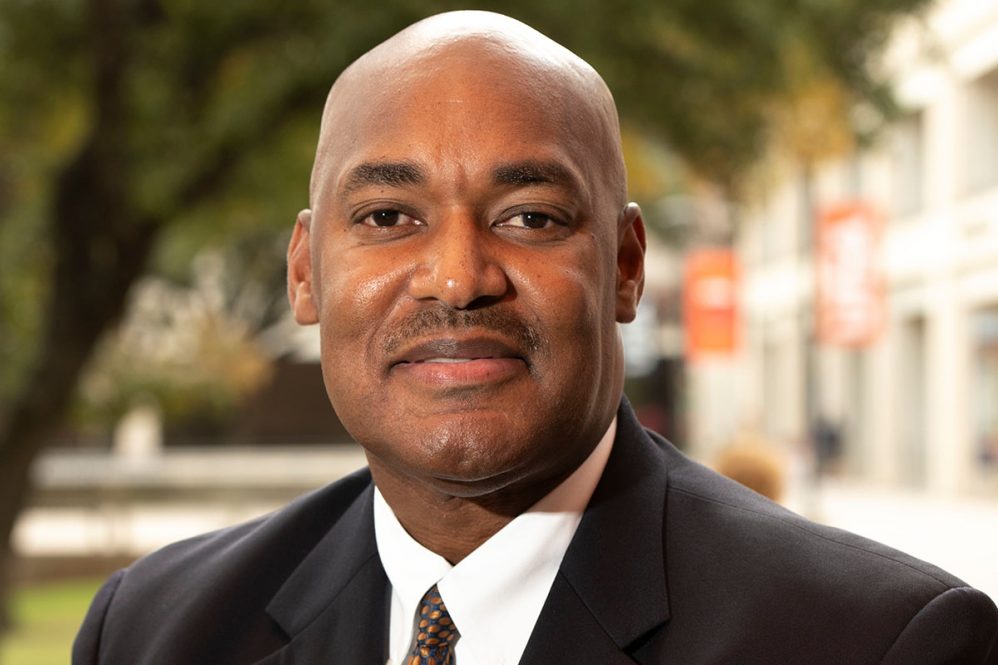Gerald Lewis Jr., chief of police and associate vice president of public safety at The University of Texas at San Antonio, has been selected as the next chief of police at the UConn Police Department, President Thomas C. Katsouleas announced Wednesday.
Lewis has three decades’ worth of deep roots in public safety, including 26 years in the New Jersey State Police and two years as chief of the East Carolina University Police Department before moving to UTSA in 2016.
Lewis was selected after a highly competitive nationwide search for the UConn police chief position, in which he will lead 100 sworn police officers assigned to seven campuses across the state. He will begin at UConn on July 1.
“We could not be more honored and delighted that Chief Lewis will be joining UConn,” Katsouleas said. “He brings extensive experience and a deep commitment to partnering with constituencies throughout our campuses.
“He also has a proven record of including and honoring all voices and viewpoints, knowing as we do that ensuring public safety is a community-wide endeavor,” Katsouleas added. “His experience, enthusiasm, and dedication to public safety make him a perfect fit to lead the UConn Police Department as it continues to pursue excellence.”
The UConn Police Department is an internationally accredited law enforcement agency with the same statutory authority as any municipal police department in the State of Connecticut. Its officers are stationed at the main campus in Storrs; UConn Health in Farmington; the regional campuses in Hartford, Stamford, Avery Point and Waterbury; and the School of Law in Hartford.
The UCPD is part of the UConn Division of Health and Safety – previously known as the Division of Public Safety – along with the UConn Fire Department, Environmental Health & Safety, the Office of Emergency Management, and the Office of the Fire Marshal & Building Inspector.
“I am humbled and honored to be selected to serve as the next Chief of Police at the University of Connecticut. I am privileged to be able to serve a university with such an outstanding academic and athletic legacy,” Lewis said. “I want students, parents, faculty, staff and all other constituencies at UConn to know that I am truly and deeply dedicated to providing a safe and inclusive community.”
Lewis earned praise for his work as UTSA’s police chief over the past nearly five years, including making significant strides in expanding and improving services for campus security, providing easy-to-use methods to notify police of locations needing safety enhancements, and opening additional avenues for reporting campus crimes.
He also prizes community involvement and building meaningful relationships with other members of the campus community, who have joked that walking with him to meetings at UTSA always required building in extra time so he could check in with students and colleagues as he encountered them.
“When I’m out and about, I meet people pretty easily and truly enjoy talking with everyone. I’m already planning in my head about setting up meetings with UConn students groups, faculty and staff groups, and other stakeholders once I arrive,” Lewis said this week, noting he also is excited to spend time at the regional campuses and get to know all that Connecticut has to offer.
Lewis joins UConn as its police chief at a noteworthy time as the University transitions into pandemic recovery and campus re-entry procedures, while also considering ways to ensure diversity and inclusivity at all levels, cultural competency, and heightened awareness of students’ mental healthcare needs.
Lewis has a strong track record in each of those areas. He said he is especially proud to have served as a staff adviser to the Black Student Union at UTSA, and valued working with the University’s Student Government Association, Spectrum – an LGBTQIA+ focused organization on campus – and other groups. He also is staff chair for the Black Faculty and Staff Association at UTSA.
Following last year’s news on the death of George Floyd in Minneapolis, Lewis also spent time with the UTSA football and men’s basketball teams to discuss what has been occurring in the country and how it affected them as individuals. Lewis noted that these moments will stay with him as he embarks on the next phase of his professional life at UConn.
“Interactions with diverse communities to discuss issues that arise between the community and law enforcement are vital to the university community,” Lewis said in the letter accompanying his application for the chief’s position.
“Being able to provide the community with a better understanding of police and university operations and the services they provide through outreach efforts and partnerships with local clergy, civic organizations, and community leaders can avoid problems before they occur.”
Lewis said this week that he will be highly accessible as chief, as has been his style at all of his positions; and that he and his family are excited to spend time in Downtown Storrs and throughout the region.
He will be joined in Connecticut by his wife, Michelle, who also has a professional background in higher education, and their 16-year-old son, Aaron (“No one cheers harder for teams than Aaron does, so you’re getting an enthusiastic UConn fan there,” Lewis said).
They’ll also be accompanied by Champ, their exuberant boxer puppy, who will be just shy of 1 year old when they arrive at Storrs and likely will often be spotted exploring and enjoying the campus with the Chief.
Lewis earned bachelors and master’s degrees from Fairleigh Dickinson University and is a graduate of the Southern Police Institute Executive Training Program.
He began his law enforcement career after graduating in 1987 as a member of the 109th New Jersey State Police Training Class, in which his peers recognized him as the outstanding recruit in his class and selected him to deliver the commencement speech.
During his 26 years as a state trooper, he received a Meritorious Service Award for his role in the pursuit and arrest of a carjacking suspect; and a Certificate of Commendation Award for saving a choking victim by performing the Heimlich maneuver.
He attained the rank of Major during his career and served as the agency’s communications director and later as its chief spokesperson, then as commanding officer of the Office of Community Affairs.
In the latter role, he partnered with the local NAACP chapter, other civic organizations, religious communities and regional leaders to ensure that qualified minority candidates were recruited and afforded the opportunity to become New Jersey troopers. The partnership resulted in the two most diverse classes in State Police history, graduating in 2013.
Lewis is a member of numerous police executive organizations including CALEA (Commission on Accreditation of Law Enforcement Agencies), IACLEA (International Association of Campus Law Enforcement Administrators), NOBLE (National Organization of Black Law Enforcement Executives), IACP (International Association of Chiefs of Police) and PERF (Police Executive Research Forum).
Earlier this year, Lewis was nominated as a finalist for the Campus Safety Director of the Year Award by Campus Safety Magazine. He is also a recipient of the prestigious NAACP President’s Award and the University of Texas System’s 2018 Police Pacesetter Department of the Year award.
Most recently, Lewis’ team introduced the Fair and Impartial Policing Training program on the UTSA campus to enhance understanding of implicit bias, helping participants recognize and dispel preconceived notions that could adversely affect their work and interactions with the public.
“During his time at UTSA, Chief Lewis’s accomplishments made invaluable positive impacts to our campus,” said Veronica Salazar Mendez, UTSA chief financial officer and senior vice president for Business Affairs. “On behalf of university leadership, I wish him much success in his new role, and I thank him for his leadership and service to our community.”



